

Edward B. Titchener Biography. Best Known For: Birth and Death: Born on January 11, 1867 Died on August 3, 1927 Early Life: Edward Bradford Titchener was born in 1867 in Chichester, England and attended Malvern College on a scholarship.
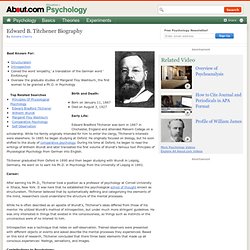
While his family originally intended for him to enter the clergy, Titchener's interests were elsewhere. Edward B. Titchener. Biography[edit] Education and early life[edit] Titchener attended Malvern College and then went on to Oxford from 1885 to 1890.
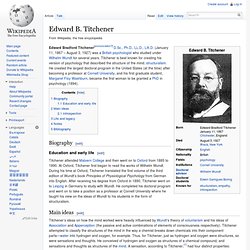
At Oxford, Titchener first began to read the works of Wilhelm Wundt. During his time at Oxford, Titchener translated the first volume of the third edition of Wundt’s book Principles of Physiological Psychology from German into English. After receiving his degree from Oxford in 1890, Titchener went on to Leipzig in Germany to study with Wundt. Main ideas[edit] Titchener believed that if the basic components of the mind could be defined and categorized that the structure of mental processes and higher thinking could be determined.
Introspection[edit] The main tool that Titchener used to try to determine the different components of consciousness was introspection. In "Experimental Psychology: A Manual of Laboratory Practice", Titchener detailed the procedures of his introspective methods precisely. Life and legacy[edit] Notes[edit] Bibliography[edit] Titchener, Edward B. – FREE Titchener, Edward B. information. Edward Bradford Titchener (1867-1927), a psychologist, was born in England, reared in the German (Wundtian) tradition, and spent his adult, professional years in America.
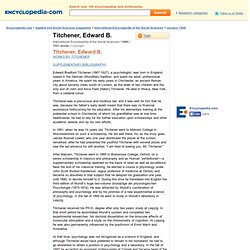
He spent his early years in Chichester, an ancient Roman city about seventy miles south of London, as the elder of two children and the only son of John and Alice Field (Habin) Titchener. He died in Ithaca, New York, from a cerebral tumor. Titchener was a precocious and studious lad, and it was well for him that he was, because his father’s early death meant that there was no financial assistance forthcoming for his education. After his elementary training at the prebendal school in Chichester, of which his grandfather was at one time headmaster, he had to rely for his further education upon scholarships and other academic awards won by his own efforts. In 1881, when he was 14 years old, Titchener went to Malvern College in Worcestershire on such a scholarship. Titchener wrote two more textbooks. Karl M. Edward Titchener Research Papers discuss Titchener's Theories. A research paper on Edward Titchener could begin: Edward Titchener was an English born psychologist.
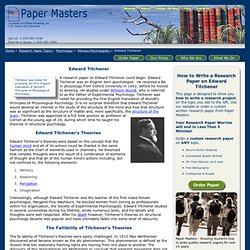
He received a BA in physiology from Oxford University in 1892, before he moved to America. He studied under Wilhelm Wundt, who is referred to as the Father of Experimental Psychology. Titchener was noted for providing the first English translation of Wundt’s Principles of Physiological Psychology. It is no surprise therefore that Edward Titchener would develop an interest in the study of the structure of the mind and how that structure was as significant as the structure of matter and, more specifically, the structure of the brain. Titchener was appointed to a full time position as professor at Cornell at the young age of 28, during which time he taught his theories in structural psychology.
Edward Titchener’s theories were based on the concept that the human mind and all of its actions could be charted in the same fashion as the chart of elements used in chemistry. Paper Masters. Edward Titchener & Psychology: Contributions, Lesson & Quiz. In this lesson you'll learn who Edward Bradford Titchener was and what he contributed to the field of psychology.
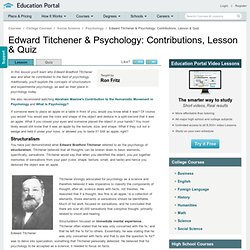
Additionally, you'll explore the concepts of structuralism and experimental psychology, as well as their place in psychology today. If someone were to place an apple on a table in front of you, would you know what it was? Of course you would! You would see the color and shape of the object and deduce in a split-second that it was an apple.
What if you closed your eyes and someone placed the object in your hands? Structuralism You have just demonstrated what Edward Bradford Titchener referred to as the psychology of structuralism. Titchener strongly advocated for psychology as a science and therefore believed it was imperative to classify the components of thought; after all, science deals with facts, not theories. Structuralism focused on immediate mental experience. Edward Bradford Titchener. Titchener was born in Chichester, England in a family whose fortunes had seen better days.
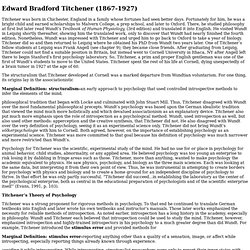
Fortunately for him, he was a bright child and earned scholarships to Malvern College, a prep school, and later to Oxford. There, he studied philosophy at first but later read Wundt’s Textbook of Human Physiology, (3rd edition) and translated it into English. He visited Wundt in Leipzig shortly thereafter, showing him the translated work, only to discover that Wundt had nearly finished the fourth edition. Nonetheless, Wundt was impressed with Titchener and urged him to go back to Oxford to take a year of biology. Titchener did so and then returned to Leipzig where he obtained his PhD from Wundt two years later.
The structuralism that Titchener developed at Cornell was a marked departure from Wundtian voluntarism. Marginal Definition: structuralism-an early approach to psychology that used controlled introspective methods to infer the elements of the mind.